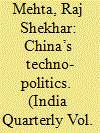| Srl | Item |
| 1 |
ID:
192935


|
|
|
|
|
| Summary/Abstract |
The impact of China’s Digital Silk Road (DSR) on countries signing the Belt and Road Initiative (BRI) is a less explored area. This article argues that the repercussions of unregulated propagation of DSR on BRI countries are likely to go beyond economy and commerce because of the vastly different approach of China’s use of technology in its own governance. Since this aspect is inadequately covered in existing literature, an attempt is made to fill the gap. When external entities are allowed to setup large-scale digital networks, e-governance and e-commerce in technologically deficient countries of the Global South, the host country loses control over its digital data that such networks generate. Overdependence on technology of one nation can lead to a data monopoly with a potential impact on the entire polity. To what extent this hypothesis holds substance is the issue deliberated on in this article using inductive reasoning and qualitative methods.
|
|
|
|
|
|
|
|
|
|
|
|
|
|
|
|
| 2 |
ID:
195203


|
|
|
|
|
| Summary/Abstract |
The People’s Republic of China’s (PRC) approach to data governance, centred on data sovereignty, is much debated in academic literature. However, it remains unclear how the PRC’s different state actors justify this approach. Based on an analysis of the discourse and behaviour of the PRC’s state actors through strategic framing theory, their role as a privacy guardian can arguably be described as strategically constructed. The Chinese government and legislative bodies have tailored their communications to present themselves as champions of individual privacy, aiming to secure support for state policies. This strategic framing encompasses four mechanisms: the reframing of privacy threats through political narratives; legal ambiguities; selective framing; and the implementation of censorship to influence public discourse. An examination of how the Chinese government responded differently to data breaches in the cases of Didi and the Shanghai National Police Database leak highlights the Chinese government’s efforts in maintaining framing consistency to construct itself as a guardian, rather than a violator, of individual privacy.
|
|
|
|
|
|
|
|
|
|
|
|
|
|
|
|